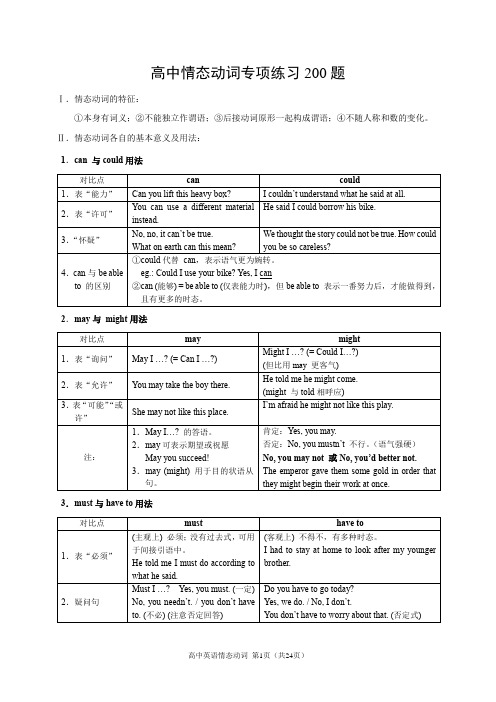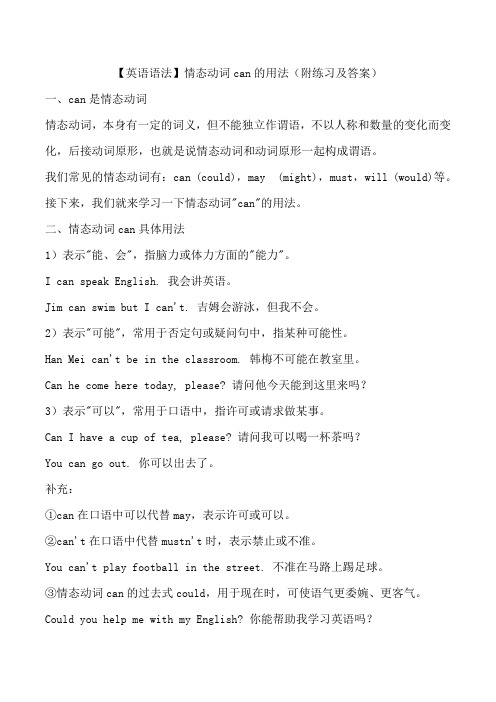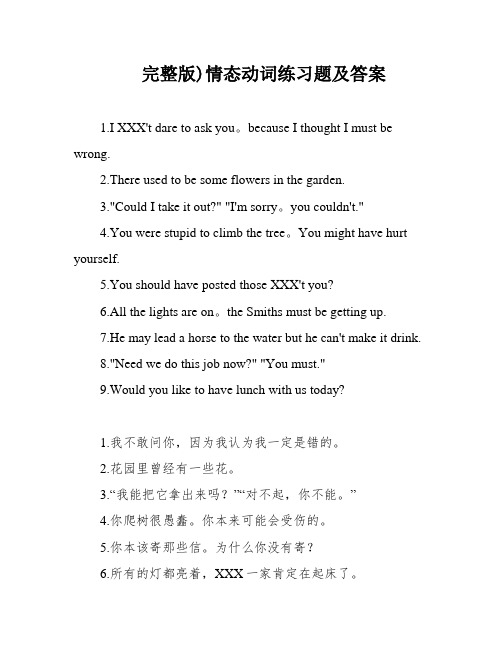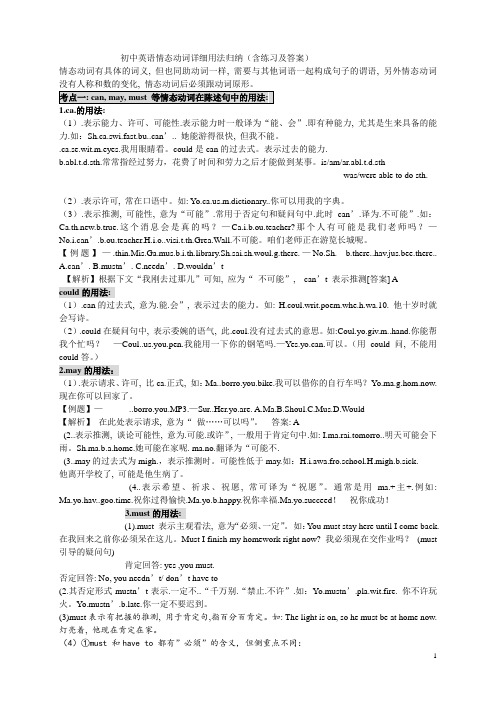(完整版)情态动词用法及其练习与答案
(完整版)情态动词专项练习及答案

情态动词专项练习1。
Jean have kept his promise. I wonder why he changed his idea.A. mustB. should C。
need D. would解析:选B。
“should have +过去分词” 表示“过去本来应该(但没能)做某事”;keep one’s promise 意为“信守诺言”。
2。
Jane have come to the party, but she not find the exact time。
A. could; couldB. might; couldC. should; could D。
should; would解析:选A。
“ could have+过去分词表示过去本来应该(但没能)做某事”.3. So many mistakes in your homework! You more careful.A。
may be B. had to C. would be D. should have been解析:选D。
“You should have been more careful”。
意为:你本来应该更细心的。
4.Her brother be at home now, because he was seen playing basketball in the stadium just now.A。
mustn’t B. needn’t C。
can’t D. shouldn't解析:选C。
can’t be at home 意为:不可能在家.5.-——I can’t understand why ou r boss is late.———He the early bus.A。
could miss B。
may have missedC. can have missed D。
might miss解析:选B. “may have+过去分词"表示对过去动作的判断,意为:可能做了某事。
七年级英语情态动词准确使用练习题20题(带答案)

七年级英语情态动词准确使用练习题20题(带答案)1. In the school library, you ______ keep quiet.A. canB. couldC. mayD. must答案解析:D。
本题考查情态动词的用法。
can表示能力,“能够”;could是can的过去式,也可用于现在表示更委婉的请求;may表示许可或可能性,“可以,也许”。
在图书馆里需要保持安静是一种规定,must表示“必须”,所以这里应该选D。
2. - ______ I borrow your pen? - Sure.A. CanB. CouldC. MayD. Might答案解析:A。
这里是询问是否可以借笔,can表示请求许可,常用于口语中,比较直接。
could也可表示请求许可,但比can更委婉,常用于一般疑问句中,但在回答中通常用can。
may表示许可时,比较正式,这里是比较随意的场景,所以不选C。
might是may的过去式,也表示可能性,在这里不合适,所以选A。
3. He ______ run very fast when he was young.A. canB. couldC. mayD. might答案解析:B。
句中提到“when he was young”是过去的时间,can 的过去式是could,表示过去的能力,他年轻时能跑得很快,所以选B。
A选项can表示现在的能力;C选项may表示许可或可能性,与题意不符;D选项m ight表示可能性,在这里不表示能力,所以不选。
4. - ______ it be true? - I'm not sure.A. CanB. CouldC. MayD. Might答案解析:A。
这里是对事情真实性的一种推测,can用于疑问句中表示推测,“可能”,通常用于否定句和疑问句中。
could也可用于表示推测,但这里没有必要用过去式。
may和might表示可能性时,一般不用于疑问句的这种推测,所以选A。
情态动词的用法及练习(附答案)

情态动词的⽤法及练习(附答案)情态动词的⽤法及专项练习第1 & 2类:第3类1.could have p.p.①指过去某事有可能发⽣, 但并未.真的..发⽣。
They could have won the race, but they didn't try hard enough.He could have studied harder, but he was too lazy and that's why he failed the exam.②指过去有能⼒做某事, 但并未真的...做过。
I could have stayed up late, but I decided to go to bed early.Julie could have bought the book, but she borrowed it from the library instead.③对过去的发⽣事情做出⼀种猜测,但实际上并不知道真假。
仅仅是做⼀种观点上的表达。
He could have got stuck in traffic.He could have forgotten that we were meeting today.He could have overslept.2. may / might have p.p.(⽤法与could have p.p.第③点相同)对过去的发⽣事情做出⼀种猜测,但实际上并不知道真假。
仅仅是做⼀种观点上的表达。
He might have got stuck in traffic.He might have forgotten that we were meeting today.He might have overslept.3. couldn't have p.p.渴望、期望做某事, 但由于外部原因不可能做成, 即便是很想做。
是⼀种虚拟语⽓。
情态动词练习题及答案

情态动词练习题及答案1. 你的朋友不会游泳,你告诉他不要跳进深水区。
- 你不能跳进深水区,因为你________游泳。
- 答案:不会2. 老师要求学生必须完成作业。
- 老师告诉我们,我们________完成作业。
- 答案:必须3. 你的朋友问你是否可以借用你的自行车。
- 我可以借用你的自行车吗?- 答案:可以4. 医生建议病人应该每天服用两次药。
- 医生建议病人________每天服用两次药。
- 答案:应该5. 你告诉朋友,你可能会迟到。
- 我可能会迟到。
- 答案:可能6. 你告诉朋友,你不可能完成这个任务。
- 我________完成这个任务。
- 答案:不可能7. 你的朋友问你,他是否需要带伞。
- 你需要带伞吗?- 答案:需要8. 你告诉朋友,你或许会参加晚会。
- 我或许会参加晚会。
- 答案:或许9. 你的朋友问你,他是否应该接受这个工作。
- 你应该接受这个工作吗?- 答案:应该10. 你告诉朋友,你不得不去开会。
- 我________去开会。
- 答案:不得不11. 你的朋友问你,他是否可以明天再交报告。
- 我可以明天再交报告吗?- 答案:可以12. 你告诉朋友,你可能会去度假。
- 我可能会去度假。
- 答案:可能13. 你的朋友问你,他是否应该学习英语。
- 你应该学习英语吗?- 答案:应该14. 你告诉朋友,你不可能在一天内完成这个项目。
- 我________在一天内完成这个项目。
- 答案:不可能15. 你的朋友问你,他是否需要帮忙。
- 你需要帮忙吗?- 答案:需要答案1. 不会2. 必须3. 可以4. 应该5. 可能6. 不可能7. 需要8. 或许9. 应该10. 不得不11. 可以12. 可能13. 应该14. 不可能15. 需要通过这些练习题,学习者可以更好地理解和使用情态动词。
情态动词的使用在英语中非常广泛,掌握它们对于提高英语水平至关重要。
高中英语情态动词专项练习200题(含答案)

高中情态动词专项练习200题Ⅰ.情态动词的特征:①本身有词义;②不能独立作谓语;③后接动词原形一起构成谓语;④不随人称和数的变化。
Ⅱ.情态动词各自的基本意义及用法:1.can 与could用法2.may与might用法3.must与have to用法4.need与dare用法5.should与ought to用法6.shall与will用法7.used to与would用法Ⅲ.情态动词表推测:1.大多数情态动词(除表‘能力、许可、意志’外),都可以表示推测,其程度有差异。
按可能性程度的高低排列为:must﹥will ﹥would ﹥ought to ﹥should完全肯定完全可能很可能﹥can ﹥could﹥may ﹥might可能有可能2.区分情态动词的否定含义:may not或许不、可能不might not可能不can’t 不可能mustn’t不许、禁止shouldn’t不应该needn’t 不必3.情态动词表推测具体运用:情态动词可以对现在、进行、过去推测。
4.表示反劝的特殊的表推测形式5.注意:Ⅳ.情态动词表推测的反意疑问句1.情态动词表推测的反意疑问句,简单来说,就是以情态动词后的时态为淮,如句子里有明确的时间状语,则以其为准。
2.以must 为例:e.g.: 1.You must be hungry now, aren’t you?2.He must be watching TV , isn’t he ?3.Tom must have lived her for a long time, hasn’t he ?4.She must have arrived yesterday, didn’t she?注:如选择题中(以She must have arrived yesterday, didn’t she?为例)既有didn’t she又有hasn’t she 则以didn’t she?为最佳答案。
【英语语法】情态动词can的用法(附练习及答案)

【英语语法】情态动词can的用法(附练习及答案)一、can是情态动词情态动词,本身有一定的词义,但不能独立作谓语,不以人称和数量的变化而变化,后接动词原形,也就是说情态动词和动词原形一起构成谓语。
我们常见的情态动词有:can (could),may (might),must,will (would)等。
接下来,我们就来学习一下情态动词"can"的用法。
二、情态动词can具体用法1)表示"能、会",指脑力或体力方面的"能力"。
I can speak English. 我会讲英语。
Jim can swim but I can't. 吉姆会游泳,但我不会。
2)表示"可能",常用于否定句或疑问句中,指某种可能性。
Han Mei can't be in the classroom. 韩梅不可能在教室里。
Can he come here today, please? 请问他今天能到这里来吗?3)表示"可以",常用于口语中,指许可或请求做某事。
Can I have a cup of tea, please? 请问我可以喝一杯茶吗?You can go out. 你可以出去了。
补充:①can在口语中可以代替may,表示许可或可以。
②can't在口语中代替mustn't时,表示禁止或不准。
You can't play football in the street. 不准在马路上踢足球。
③情态动词can的过去式could,用于现在时,可使语气更委婉、更客气。
Could you help me with my English? 你能帮助我学习英语吗?三、情态动词can的基本句型1)肯定句型为:主语+can+动词原形+其它。
They can play basketball. 他们能打篮球。
完整版)情态动词练习题及答案

完整版)情态动词练习题及答案1.I XXX't dare to ask you。
because I thought I must be wrong.2.There used to be some flowers in the garden.3."Could I take it out?" "I'm sorry。
you couldn't."4.You were stupid to climb the tree。
You might have hurt yourself.5.You should have posted those XXX't you?6.All the lights are on。
the Smiths must be getting up.7.He may lead a horse to the water but he can't make it drink.8."Need we do this job now?" "You must."9.Would you like to have lunch with us today?1.我不敢问你,因为我认为我一定是错的。
2.花园里曾经有一些花。
3.“我能把它拿出来吗?”“对不起,你不能。
”4.你爬树很愚蠢。
你本来可能会受伤的。
5.你本该寄那些信。
为什么你没有寄?6.所有的灯都亮着,XXX一家肯定在起床了。
7.他可能引马到水边,但他不能强迫它喝水。
8.“我们现在需要做这个工作吗?”“你必须这么做。
”9.你今天愿意和我们一起吃午餐吗?10.He said that you could watch TV all evening if you wished.11.–Is John coming by train。
--He should。
初中英语情态动词详细用法归纳(含练习及答案)

初中英语情态动词详细用法归纳(含练习及答案)情态动词有具体的词义, 但也同助动词一样, 需要与其他词语一起构成句子的谓语, 另外情态动词没有人称和数的变化, 情态动词后必须跟动词原形。
1.ca.的用法:(1).表示能力、许可、可能性.表示能力时一般译为“能、会”.即有种能力, 尤其是生来具备的能力.如:Sh.ca.swi.fast.bu..can’.. 她能游得很快, 但我不能。
.ca.se.wit.m.eyes.我用眼睛看。
could是can的过去式。
表示过去的能力.b.abl.t.d.sth.常常指经过努力,花费了时间和劳力之后才能做到某事。
is/am/ar.abl.t.d.sthwas/were able to do sth.(2).表示许可, 常在口语中。
如: .m.dictionary..你可以用我的字典。
(3).表示推测, 可能性, 意为“可能”.常用于否定句和疑问句中.此时can’.译为.不可能”.如:Ca.th.new.b.true.这个消息会是真的吗?—Ca.i.b.ou.teacher?那个人有可能是我们老师吗?—No.i.can’.b.ou.teacher.H.i.o..visi.t.th.Grea.Wall.不可能。
咱们老师正在游览长城呢。
【例题】—.thin.Mis.Ga.mus.b.i.th.library.Sh.sai.sh.woul.g.there.—No.Sh.__b.there..hav.jus.bee.there..A.can’.B.mustn’.C.needn’.D.wouldn’t【解析】根据下文“我刚去过那儿”可知, 应为“不可能”, can’t 表示推测[答案] Acould的用法:(1).can的过去式, 意为.能.会”, 表示过去的能力。
如: H.coul.writ.poem.whe.h.wa.10. 他十岁时就会写诗。
(2).could在疑问句中, 表示委婉的语气, 此.coul.没有过去式的意思。
- 1、下载文档前请自行甄别文档内容的完整性,平台不提供额外的编辑、内容补充、找答案等附加服务。
- 2、"仅部分预览"的文档,不可在线预览部分如存在完整性等问题,可反馈申请退款(可完整预览的文档不适用该条件!)。
- 3、如文档侵犯您的权益,请联系客服反馈,我们会尽快为您处理(人工客服工作时间:9:00-18:30)。
情态动词情态动词有can (could), may (might), must, have to, shall (should, will (would), dare (dared), need (needed), ought to等。
情态动词无人称和数的变化;不能单独使用,必须与其后的动词原形构成谓语。
一、can, could1) 表示能力(体力、知识、技能)。
如:Can you lift this heavy box? (体力)Mary can speak three languages.(知识)Can you skate?(技能)此时可用be able to代替。
Can只有一般现在式和一般过去式;而be able to则有更多的时态。
如:I’ll not be able to come this afternoon.当表示“经过努力才得以做成功某事”时应用be able to,不能用Can。
如:He was able to go to the party yesterday evening in spite of the heavy rain.2) 表示请求和允许。
-----Can I go now?----- Yes, you can. / No, you can’t.此时可与may互换。
在疑问句中还可用could, might代替,不是过去式,只是语气更委婉,不能用于肯定句和答语中。
---- Could I come to see you tomorrow?---- Yes, you can. ( No, I’m afraid not. )3) 表示客观可能性(客观原因形成的能力)。
They’ve changed the ti metable, so we can go by bus instead.This hall can hold 500 people at least.4) 表示推测(惊讶、怀疑、不相信的态度),用于疑问句、否定句和感叹句中。
Can this be true?This can’t be done by him.How can this be true?二、may, might1) 表示请求和允许。
might比may语气更委婉,而不是过去式。
否定回答时可用can’t 或mu stn’t,表示“不可以,禁止”。
----Might/ May I smoke in this room?---- No, you mustn’t.---- May/Might I take this book out of the room?---- Yes, you can. (No, you can’t / mustn’t. )用May I...?征徇对方许可时比较正式和客气,而用Can I...?在口语中更常见。
2)用于祈使句,表示祝愿。
May you succeed!3) 表示推测、可能性(不用于疑问句)。
might不是过去式,它所表示的可能性比may小。
如:He may /might be very busy now.Your mother may /might not know the truth.三、must, have to1) 表示必须、必要。
You must come in time.在回答引出的问句时,如果是否定的,不能用mustn’t(禁止,不准),而用needn’t, don’t have to(不必).---- Must we hand in our exercise books today?---- Yes, you must.---- No, you don’t have to / you needn’t.2) must是说话人的主观看法,而have to则强调客观需要。
Must只有一般现在时,have to 有更多的时态形式。
如:H e play isn’t interesting, I really must go now.I had to work when I was your age.3) 表示推测、可能性(只用于肯定的陈述句)如:You’re Tom’s good friend, so you must know what he likes best.Your mother must be waiting for you now.四、dare, need1) dare作情态动词用时, 常用于疑问句、否定句和条件从句中, 过去式形式为dared。
如:How dare you say I’m unfair?He daren’t speak E nglish before such a crowd, dare he?If we dared not go there that day,we couldn’t get the beautiful flowers.2) need 作情态动词用时, 常用于疑问句、否定句。
在肯定句中一般用must, have to, ought to, should代替。
如:You needn’t come so early.---- Need I finish the work today?---- Yes, you must. / No, you needn’t.3) dare和need作实义动词用时,有人称、时态和数的变化。
在肯定句中,dare后面常接带to的不定式。
在疑问句和否定句中,dare后面可接带to或不带to的不定式。
而need 后面只能接带to的不定式。
如:I dare to swim across this river.He doesn’t dare (to) answer.He needs to finish his homework today.五、shall, should1) shall 用于第一人称,征求对方的意见。
What shall we do this evening?2) shall 用于第二、三人称,表示说话人给对方的命令、警告、允诺或威胁。
如:You shall fail if you don’t work hard.(警告)He shall have the book when I finish it.(允诺)He shall be punished.(威胁)六、will, would1) 表示请求、建议等,would更委婉。
Will / Would you pass me the ball, please?2) 表示意志、愿望和决心。
I will never do that again. They asked him if he would go abroad.3) would表示过去反复发生的动作或某种倾向。
would表示过去习惯时比used to正式,且没有“现已无此习惯”的含义。
如:During the vacation, he would visit me every other day.The wound would not heal.4) 表示估计和猜想。
It would be about ten o’clock when she left home.七、should, ought to1) should, ought to表示“应该”,ought to表示义务或责任,比should语气重。
如:I should help her because she is in trouble.You ought to take care of the baby.2) 表示劝告、建议和命令。
should, ought to可通用,但在疑问句中常用should。
如:You should / ought to go to class right away.Should I open the window?3) 表示推测,should , ought to (客观推测), must(主观推测)。
如:He must be home by now. (断定他已到家)He ought to/should be home by now. (不太肯定)This is where the oil must be. (直爽)This is where the oil ought to/should be. (含蓄)情态动词有具体的词义,但也同助动词一样,需要与其他词语一起构成句子的谓语,另外情态动词没有人称和数的变化,情态动词后必须跟动词原形。
考点一 can ,may, must 等情态动词在陈述句中的用法1.can 的用法(1)表示能力、许可、可能性。
表示能力时一般译为“能、会”,即有种能力,尤其是生来具备的能力,此时may 和must 均不可代替它。
如:She can swim fast, but I can’t .她能游得很快,但我不能。
I can see with my eyes. 我用眼睛看。
(2)表示可能、能够。
如:I can finish it in an hour. 我能在一小时后完成它。
(3)表示许可,常在口语中。
如:You can use my dictionary. 你可以用我的字典。
(4)表示推测,意为“可能”,常用于否定句和疑问句中,此时can’t 译为“ 不可能”。
如: Can the news be true? 这个消息会是真的吗?----Can it be our teacher? 那个人有可能是我们老师吗?----No, it can’t be our teacher. He is on a visit to the Great Wall.不可能。
咱们老师正在游览长城呢。
例 --- I think Miss Gao must be in the library. She said she would go there. --- No. She __ be there, I have just been there.A.can’tB. mustn’tC. needn’tD. wouldn’t[解析]根据下文“我刚去过那儿”可知,应为“ 不可能”,can’t 表示推测[答案] A2. could的用法(1) can的过去式,意为“ 能、会” ,表示过去的能力。
如:He could write poems when he was 10. 他十岁时就会写诗。
(2)could 在疑问句中,表示委婉的语气,此时 could 没有过去式的意思。
如: Could you do me a favour? 你能帮我个忙吗?---Could I use your pen? 我能用一下你的钢笔吗?--Yes, you can. 可以。
